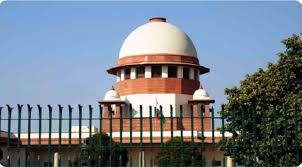(A) Sick Industrial Companies (Special Provisions) Act, 1985 – Sections 22(1) Interest on Delayed Payments to Small Scale and Ancillary Industrial Undertakings Act, 1993 – Sections 19 – Sick Industry – Recovery Suit – Maintainability – The term ‘suit for recovery’ as it appears in the said provision must be construed ejusdem generis, meaning thereby that only such a suit for recovery which is in the nature of execution or any other coercive enforcement will be suspended by the effect of the provision. There is nothing in the said provision so as to hold the legal proceedings to be not maintainable, or liable to be halted.
The suit for recovery was not of a nature which could have proved to be a threat to the properties of the defendant sick company or would have adversely impacted the scheme of revival. The suit was a simple suit for recovery of money towards the dues arising under the alleged illegal deductions under the contract. This cannot be said to be a proceeding in the nature of execution, distress or the like and hence the suit was not hit by Section 22(1) of the 1985 Act.
The adjudication and determination of a contested liability under a contract is undoubtedly the domain of the civil court or an arbitral tribunal and not that of the BIFR or the AAIFR.
By no stretch of imagination could it be said that the legislature intended to include even the proceedings for the adjudication of the liabilities not admitted by a sick company within the protective ambit of Section 22(1) of the 1985 Act.
The original plaintiff’s suit wasn’t barred by Section 22(1) of the 1985 Act, thus the decree stands valid. High Court’s award of 24% interest is maintained but calculated excluding the period of sickness under the 1985 Act. (Para 89, 96,98, 99, 104, 142, 143, 144)
(B) Sick Industrial Companies (Special Provisions) Act, 1985 – Sections 22(1 – Sick Industrial Company – Recovery of Money –Suspension of Legal Proceedings – Suspension of Legal Proceedings under Section 22(1) of the 1985 Act -The applicability of Section 22(1) of the 1985 Act hinges on three conditions:
i. Pending inquiry under Section 16, preparation/consideration of scheme under Section 17, or pending appeal under Section 25.
ii. The nature of proceedings, including those akin to the types enumerated in the provision.
iii. The proceedings threatening the assets and rehabilitation scheme of the sick company.
The Court clarified that the provision doesn’t shield proceedings unrelated to rehabilitation or execution of the scheme.
The legislative intent behind Section 22(1) is to ensure expeditious revival, not absolute immunity for sick companies. (Para 67, 97, 98, 99, 100, 101, 108, 109, 110, 114, 115, 116, 117, 118, 119, 120, 121, 124)
(C) Interest on Delayed Payments to Small Scale and Ancillary Industrial Undertakings Act, 1993 – Sections 4, 5, 6 – Small Scale Industry – Rate of Interest – Compound Interest, Harmonious Construction – The High Court’s award of 24% compound interest is upheld. However, interest accrual during the period of sickness under the 1985 Act is excluded. Harmonious construction of the 1985 and 1993 Acts is emphasized.(Para 125, 126, 127, 128)
SUPREME COURT OF INDIA
2024 STPL(Web) 301 SC
[2024 INSC 348]
Fertilizer Corporation Of India Limited & Ors. Vs. M/S Coromandal Sacks Private Limited
Civil Appeal Nos. 5366-5367 of 2024-Decided on 26-4-2024
https://stpllaw.in/wp-content/uploads/2024/05/2024-STPLWeb-301-SC.pdf







